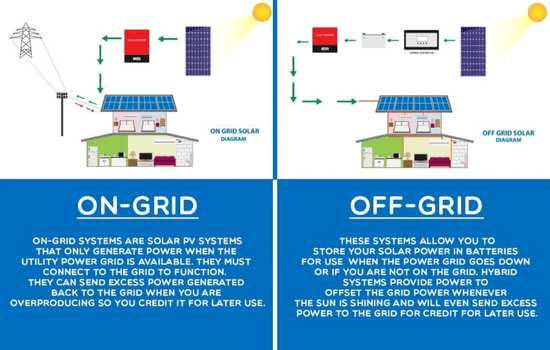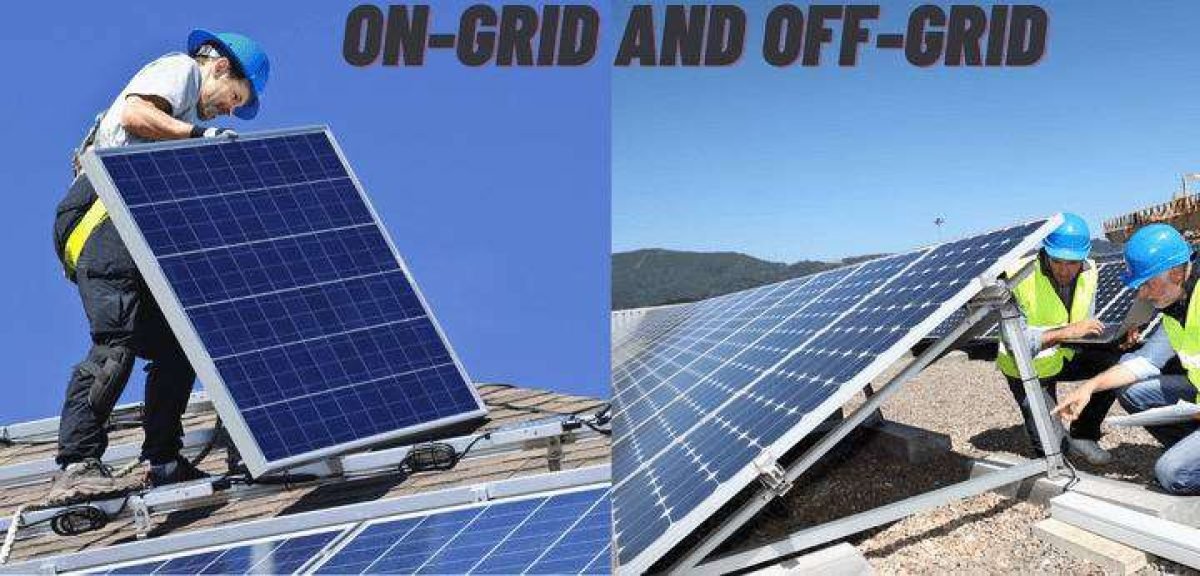Installing a solar power system can be a difficult process, especially for a client who must make numerous decisions. Such as selecting the appropriate solar panels, and predicting power usage. Deciding between an off-grid and on-grid solar power system, and more.
Although all solar power systems use the photovoltaic (PV) effect. The user determines how the energy has generated by solar devices that have used. For example, if you want to use solar energy without connection to the grid. You can go for an off-grid solar panel. If your energy output exceeds your consumption. An on-grid solar power system can assist you to send any excess energy to the grid via the grid.
Does it appear to be difficult? The distinction between an on-grid and an off-grid solar panel is actually pretty straightforward. An off-grid solar panel does not connect to the grid. On the other hand, an On-grid solar panel does connect to the utility grid. The equipment needed for installation, as well as the installation process and energy prices. All have determined by the grid system selected by the customer.
A home solar panel must be able to supply enough electricity to meet all of the household’s demands. It supplies AC power, which has used to power lighting systems, electronics, appliances, and types of machinery. Such as machines, refrigerators, mixers, fans, air conditioners, TVs, and music systems in most residences. The cost of a home solar power system has determined by its size and kind.
Key differences between on-grid & off-grid
Which one of the two should you purchase? Continue reading to learn the key differences between on-grid and off-grid installation.

On-grid Solar Panel
- The on-grid method is more popular than the off-grid approach. Since consumers are covered by their utility company even if their solar panels underperform or fail. In exchange, the user can accumulate credit. That can be redeemed at the conclusion of the billing cycle, (condition – State net metering policy applies.) Net metering is the term for this process. Because the user does not need to purchase a pricey battery backup system for energy storage. Being connected to the grid reduces upfront costs. The main disadvantage of an on-grid system is that it shuts down totally in the event of a power outage. As a result, in places prone to utility power outages, an on-grid power system may not provide adequate outputs.
- Unlike an off-grid solar panel, these are unable to work or generate electricity during a blackout for safety concerns. Because blackouts normally occur when the power grid is down, if the solar inverter sent energy into a downed grid, it would risk the safety of those working to repair the network. During an outage, most on-grid solar panels with battery storage can disconnect from the grid and continue to generate some power (this is known as islanding).
- Whether or not your solar panel is producing or if you have batteries, if you choose to install an on-grid solar panel, you will always have access to electricity (until the grid goes down).
- This guarantees that you have enough electricity for your needs at all times.
- Many people who want to install an on-grid solar panel wish to cover 100% or nearly 100% of their energy demand, much like they do with off-grid solar panels. This is also possible with on-grid solutions.
- Depending on the time of day you use electricity, your solar panel may produce excess energy. Rather than sending it to batteries as in an off-grid system, you can send it to the grid and be rewarded for the electricity.
- Many people in the United States will be rewarded through a system known as net metering. When your utility company compensates or credits your account for electricity generated by your solar panel and transferred to the grid, this is known as net metering.
Also Read:- Fuel Injection Pump: Working & Its Types
Off-grid Solar Panel
- Off-grid connection refers to a solar panel that has not connected to the utility grid (electric grid). In general, this sort of connection outperforms on-grid since it allows you to completely disconnect from the grid and continuously consumes solar-generated electricity.
- Even in the dead of winter, when there is less sunlight, an off-grid solar panel has perfectly built to generate enough power to meet the demands of a home. However, because an off-grid solar panel does not have access to the energy grid, battery storage is required.
- Off-grid solar panels are more expensive than alternatives due to the high cost of batteries and inverters, hence they have typically used exclusively in more rural places far from the grid. Nonetheless, as battery costs continue to fall, the demand for off-grid solar panels is growing, especially in cities and towns.
- There will almost certainly be occasions when your system produces more electricity than you need, depending on the size of the system you install, how much electricity you use, and when you use it. The equipment you install will determine what happens to the extra energy.
- Most off-grid solar panels have designed to generate a specific amount of “additional” electricity throughout the day, which has then stored in batteries. When the system is not producing, such as at night or during overcast weather, then the stored energy in the batteries can utilized.
- If the weather is unusually gloomy for several days in a row, your system may be unable to generate enough electricity to charge the batteries and meet all of your needs.
- While having extra batteries might provide peace of mind and a bank of stored electricity in the event of a power outage, they are also costly. Depending on your budget, buying more batteries than you require may be prohibitively expensive.
How to choose between on-grid and off-grid solar panel
Solar power systems are a type of clean, renewable energy that offers a variety of advantages depending on the panel you choose. Knowing the benefits of both on-grid and off-grid solar panels allows you to choose the one that best suits your needs. You may have clean and cost-effective energy with the right solar panel and proper installation, and you won’t have to worry about maintenance issues.
Pros of an On–Grid Solar Panel
- On-grid solar panels are both cost-effective and simple to set up.
- You can return the cost of your expenses in just 3-8 years by balancing your electricity costs.
- The extra energy generated by the system can use to provide a passive income for residential users.
Cons of an On-Grid Solar Panel
- On-grid solar panels lack batteries, they cannot work or generate electricity during an outage for safety concerns.
- They cannot generate solar energy and cut your electricity cost when there is no sunlight.
- They give you less of an advantage to conserve energy.
Also Read:- Digital Process Automation: How it Benefits Companies
Pros of an Off-Grid Solar Panel
- Such an off-grid solar panel can operate without relying on the grid.
- They generate enough electricity for the purpose of collecting and using it later in the evening.
- These are ideal for isolated places without access to grid power.
- The power supply will not affect by shutdowns or infrastructural failures.
Cons of an Off-Grid Solar Panel
- Off-grid systems need the purchase of a backup battery, which can be big and costly.
- Solar battery systems need routine maintenance.
- Because the system does not connect to the grid in any way, off-grid solutions do not include the feed-in-tariff.
Conclusion
The process of installing a solar power system can be challenging due to various decisions that need to be made, such as selecting the right solar panels, predicting power usage, and choosing between on-grid and off-grid systems. An on-grid solar panel connects to the utility grid, allowing excess energy to be sent back to the grid and accumulating credits for the user.
However, it shuts down during power outages. On the other hand, an off-grid solar panel operates independently and requires battery storage, making it suitable for areas far from the grid. The choice between on-grid and off-grid systems depends on factors like cost, energy independence, and access to grid power.
The dealer will most likely help to determine which of the on-grid and off-grid solar power systems is ideal for you. If you are unable to connect to the local power grid, the off-grid solar panel is your only option.
In all other conditions, an on-grid solar panel has recommended because it is both reliable and cost-effective. These systems do not require batteries, which are expensive and must replace on a regular basis. In addition, because there is no need to generate extra electricity when there is no sunlight, on-grid solar power systems require fewer panels. It reduces both costs and payback time.




